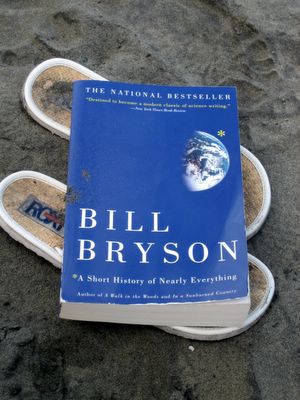A Short History of Nearly Everything

"A man said to the Universe: 'Sir, I exist!' 'However,' replied the Universe, 'the fact has not created in me a sense of obligation.'"
–Stephen Crane
And what was I reading so avidly on said cruise, you ask? Only one of the best books I’ve laid eyes on in as long as I can remember.
No, it’s not Shakespeare or Hemingway—it’s a science book. That’s right. I’m a geek. I go on a cruise to the Mexican Riviera and I bring a textbook…sorta. When was the last time you came away from a science book saying it was one of the best things you’ve ever read?
Welcome to Bill Bryson’s “A Short History of Nearly Everything.”
I first discovered Bryson from his “Walk in the Woods” which inspired my brother and me to hike the Appalachian Trail. Not that we’ve actually done it yet, mind you. But we’re inspired.
To prepare for what the New York Times has predicted will become “a modern classic of science writing,” Bryson—who is not a scientist himself but felt compelled to confront the unknowable and unravel the very mysteries of the universe—devoured scientific texts, scoured the planet for important sites, and spent time with some of the world’s leading minds.
“A Short History…” covers everything. From the Big Bang to black holes, the ice age to isotopes, dinosaurs to DNA, evolution to E=MC2. It is, as it states, an encapsulation of the history of all space/time. From the conception of the universe to you and I, here, today. All this in one cohesive narrative. Not that it’s an ambitious book or anything.
Can we know the answers to the really looming questions about our universe and ourselves, Bryson asks. How did we get from there being nothing at all to there being us? This being Bill Bryson, he answers with delightful wit, acute incisiveness and rollicking fun.
“A Short History…” is one remarkable revelation after another, illuminating just how colossal, infinitesimal, complex and just plain quirky our universe is. What we know is every bit as fascinating as how we know it. From the first clever experiments to figure out how much the earth weighs to today's enduring efforts to describe the origins of life itself, “A Short History…” makes clear that science is not a final destination but a humbling process undertaken by all-too-human people. The book is suffused with tales of the odd turns and the knock-down, drag-out personal battles between scientists whose genius was rivaled only by their lack of civility.
I cannot recommend this book highly enough. But be warned, you just might finish the last page, quit your job the next day and set out to become a particle physicist. It’s that good.


1 Comments:
I've been wanting to read this! I will hold my geekiness up next to yours anyday.
Of course we will then have to measure them with Vernier calipers, which I can explain in great detail how to work.
Post a Comment
<< Home